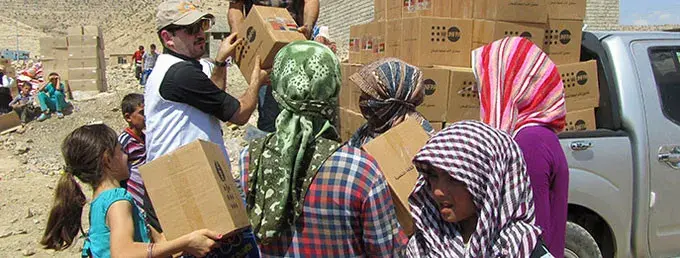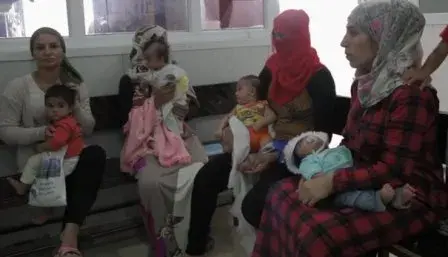KHANKE, DUHOK (IRAQ) — “Do not blame me for repeating my story as what happened to me is the unforgettable story of my life,”
a Yazidi woman, who was abducted by the so-called Islamic State (IS), said.
Golleh, (not her real name), is one of the Yazidi women who were abducted and enslaved by IS terrorist group in August 2014 when the militia took over the district of Sinjar located to the north of Iraq.
Although she was liberated after eight months of being enslaved and maltreated, the 50-year old woman said she will keep telling her story so that the world takes an action and helps those who are still in the hands of IS. She also hopes that her story would bring back her five-year old grandson who was taken by IS and whose whereabouts are not known.
“I want my voice to be heard by the whole world,”
Golleh told one social worker in Shanaz Women Social Centre that is supporting and empowering women and girls in Khanke sub district in Duhok, one of Iraq’s northern governorates.
The women centre, supported by the United Nations Population Fund (UNFPA), provides psychosocial support to traumatized women and survivors of gender based violence. It also provides recreational activities and holds awareness sessions in addition to training on different skills such as hairdressing and sewing.
“Even those who were liberated from the hands of Daesh [IS], like me, are still suffering…it has been several months, and I still cannot believe that I am alive,” Golleh said, while stressing that the legitimate cause of other Yazidi women like her should not be overshadowed by other crises.
The same words were echoed by Resalah, (not her real name). She is another Yazidi woman who is also visiting the centre almost every day. Though Resalah aged 35 years was liberated after a difficult journey, he daughter’s whereabouts are still unknown. “I heard she is in Syria now, but no further details,” she told one of the social workers.
Resalah said she was sold from one IS member to another and moved from Iraq to Syria and was enslaved for several months.
“I was sold more than once to the one who pays more,” cried the woman, adding that she used to work from dawn till dusk without rest and some days passed without a meal to maintain her energy.
Her 12-year old son was also imprisoned by IS, leaving Resalah with the fear that he might have been either deployed or killed by the terrorists.However, the bewildered Resalah received help to escape from the spouse of one of IS members for whom she was working in Syria.
“His wife sympathised with me, and helped me run away,” Resalah explained, adding she managed to cross the borders from Syria to Turkey and from there she was helped to return to Iraq, ending up in Khanke. The nightmare that she has been through, as she described her experience, was not over yet.
“I tried to commit suicide more than once… I do not want to keep remembering that bitter experience”.
But, what stopped her was her youngest son, who was the only survivor with her and the support she received in the centre.
“That is why I come here every day… sharing my experience with social workers here, the way they respond and support me keeps me stronger,” Resalah noted, adding that in addition to the psychosocial support she receives, she also takes part in the different recreational activities offered in the centre.
“They receive me with a smile, listen to me over and over again without getting bored… this gives me energy to go on”.
In addition, Resalah said she receives dignity kits from the centre which “I cannot afford buying if they would not have given to me”.
But Resalah wants to remind the world that she and “other internally displaced persons have the right to live in peace… I wish efforts are intensified to liberate those women and girls who are still in the hands of Daesh [IS], as no one will understand what an awful life they live now except women like me who have been through the same experience”.
Resalah and Golleh represent the sufferings of dozens of other Yazidi women in Khanke sub district and share their sufferings with social workers in Shanaz Women Social Centre that is supported by UNFPA, according to ZhimanDeham, the centre’s director.
She said, over the first five months of this year, 30 gender based violence survivors have been visiting the centre for consultations and psychosocial support.
“The majority of them were abducted by IS,” said Zhiman, adding that those IS survivors need continuous support.
In addition, more than 1,000 internally displaced women have benefited from the recreational activities and training courses provided in the centre.
“We want these activities to continue, as they are the only way out for the majority of those women who have been difficult experiences, lost family members and displaced,” concluded Zhiman.
Written by: Khetam Malkawi




